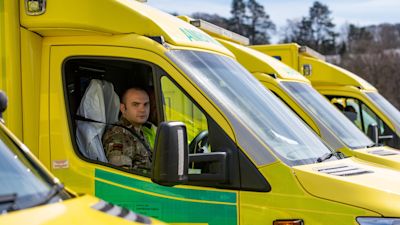Covid: Soldiers to drive Scottish ambulances from this weekend in bid to cut delays

Soldiers will drive Scottish ambulances from this weekend after Nicola Sturgeon requested help from the Army to reduce delays following the death of a man who passed away amid a 40 hour wait.
Health Secretary Humza Yousaf confirmed more than 100 military had been drafted in, with 88 drivers and 15 support staff set to support the Scottish Ambulance Service which is struggling to keep up with demand caused by Covid-19.
Additional driving support will also come from the Scottish Fire and Rescue Service, as well as the British Red Cross and private transport companies where clinically appropriate.
And around 100 second year paramedic students will assist in Scotland's ambulance control rooms.
For weeks the Scottish government has faced criticism for ambulances being unable to keep up with "unprecedented demand".
One reported victim of the ambulance crisis was Gerald Brown, 65-year-old husband and father-of-three from Glasgow, who died almost two whole days after phoning an ambulance.
His son told ITV News the "hardest part" was learning from the doctor the following day his dad "would still be here" had the ambulance arrived sooner.
At the time First Minister Sturgeon apologised "unreservedly" for ambulance delays, but said issues in the service would continue "for a period" as pressure caused by the pandemic continues and the winter months draw closer.
Scotland's health secretary told the country's parliament on Tuesday that additional funding of £20 million will be invested in the Scottish Ambulance Service to help improve response times, alleviate pressures and improve staff wellbeing.
He said: "Ambulance services around the UK, as well as the wider NHS, are experiencing unprecedented demand – largely because of Covid-19, but also due to a combination of increasingly complex cases, and exceptionally busy emergency departments."
ITV News Scotland Correspondent Peter Smith reports on the tragic death of Gerald Brown and the growing pressures facing Scotland's NHS:
"The measures we have announced today," he added, "will begin to address some of these issues, both improving the level of service for the public, and also helping to reduce the pressure on the workforce, who are doing so much to serve the public during these incredibly demanding times.”
Speaking specifically about the case of Mr Brown, on Friday a spokeswoman from the Scottish Ambulance Service said: "We have started an investigation into the circumstances relating to the delay in reaching Mr Brown and will be in contact with Mr Brown's family directly to apologise for the delay in response and pass on our sincere condolences.
"We are really sorry for their loss and our thoughts are with them at this difficult time. All findings and lessons learned will be shared with Mr Brown's family as part of the investigation process."
His case has been referred to the Procurator Fiscal and the Scottish Public Services Ombudsman with the Scottish Ambulance Service promising to “learn” from the tragedy.